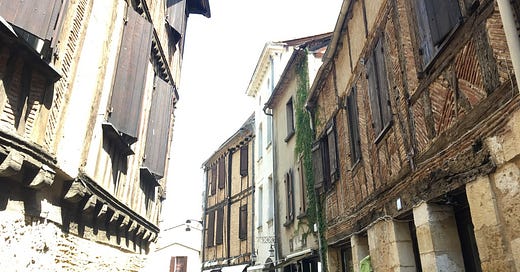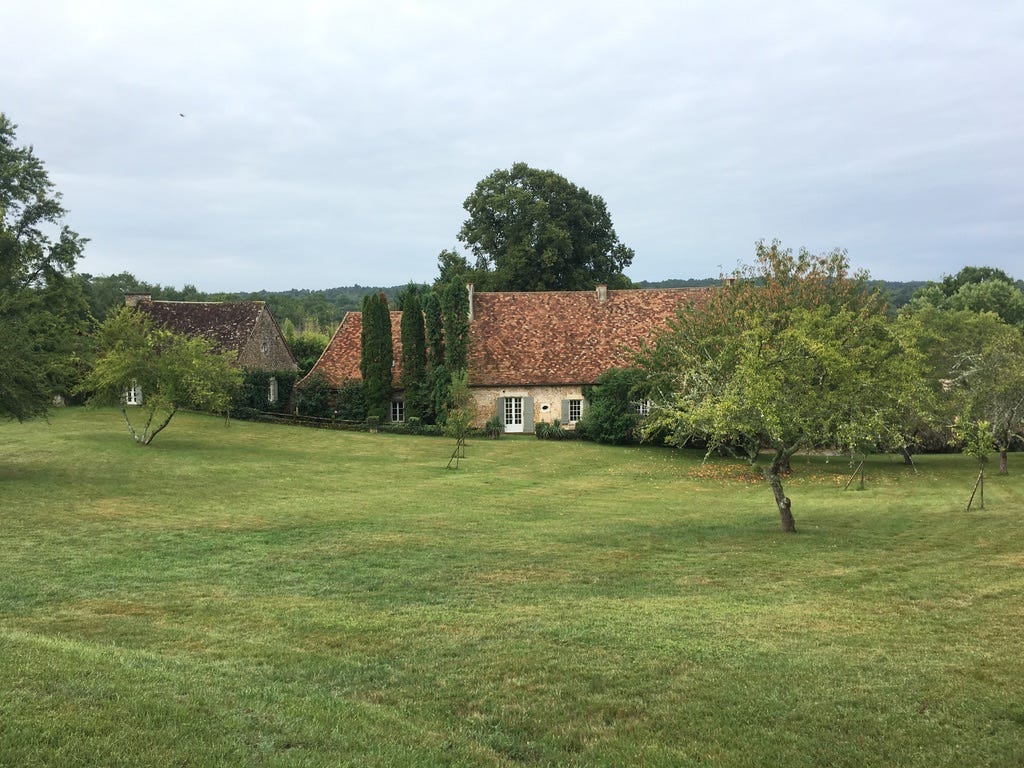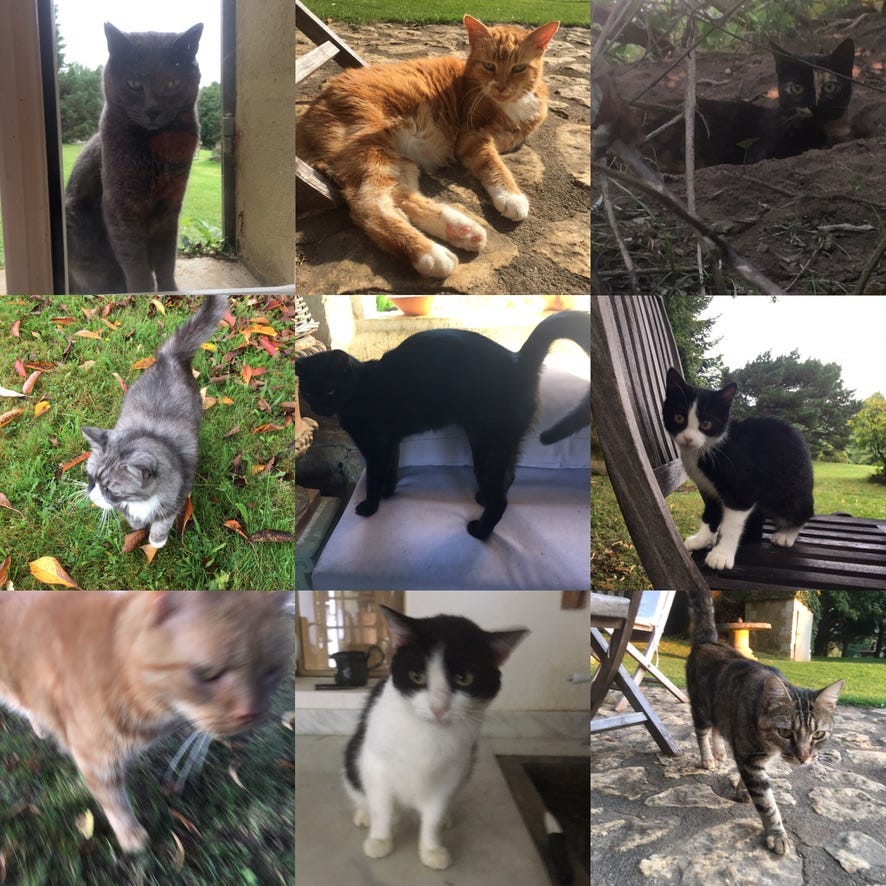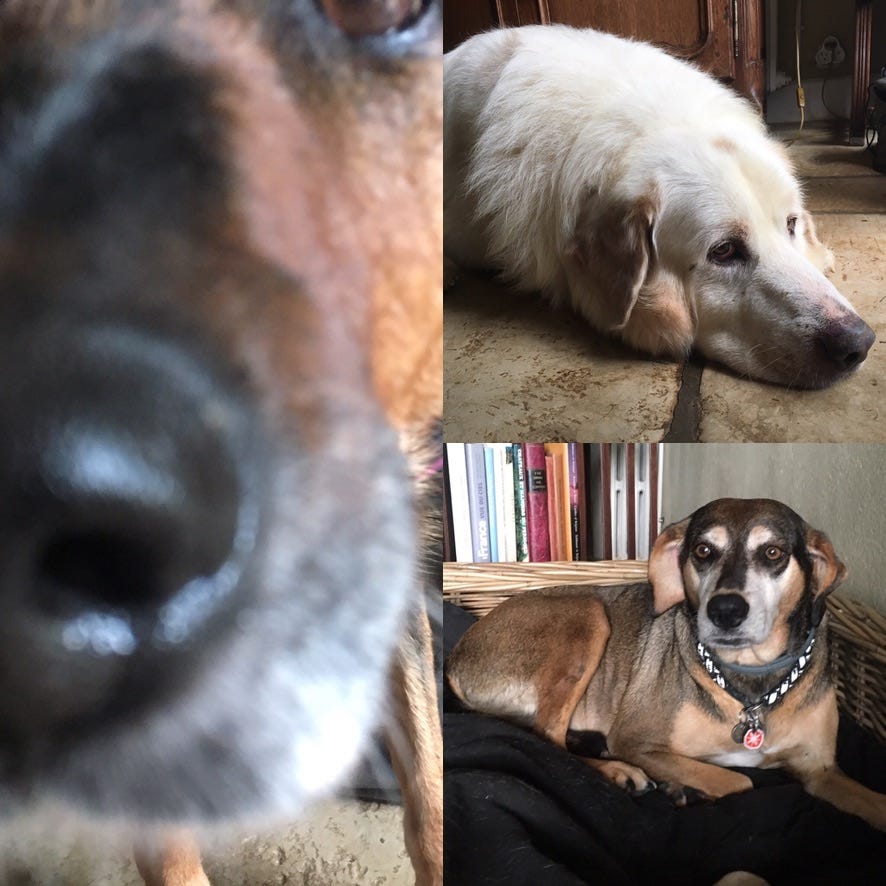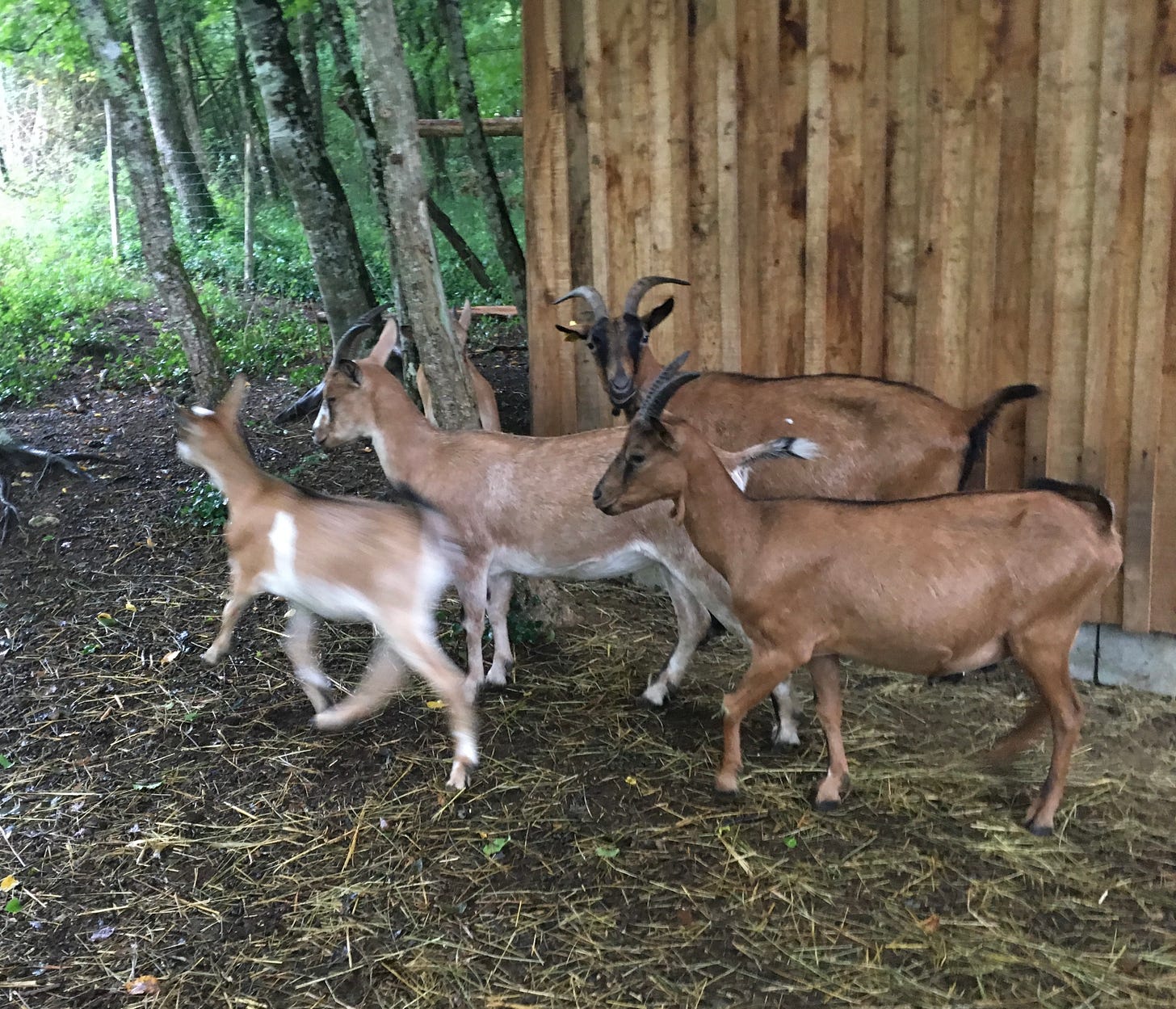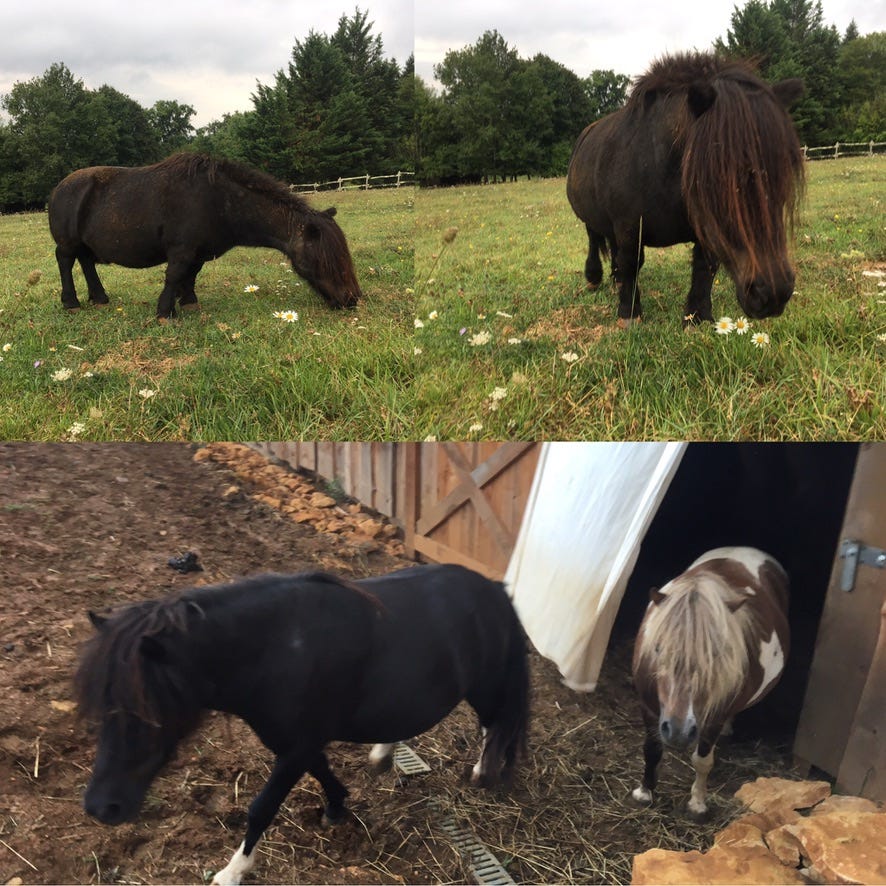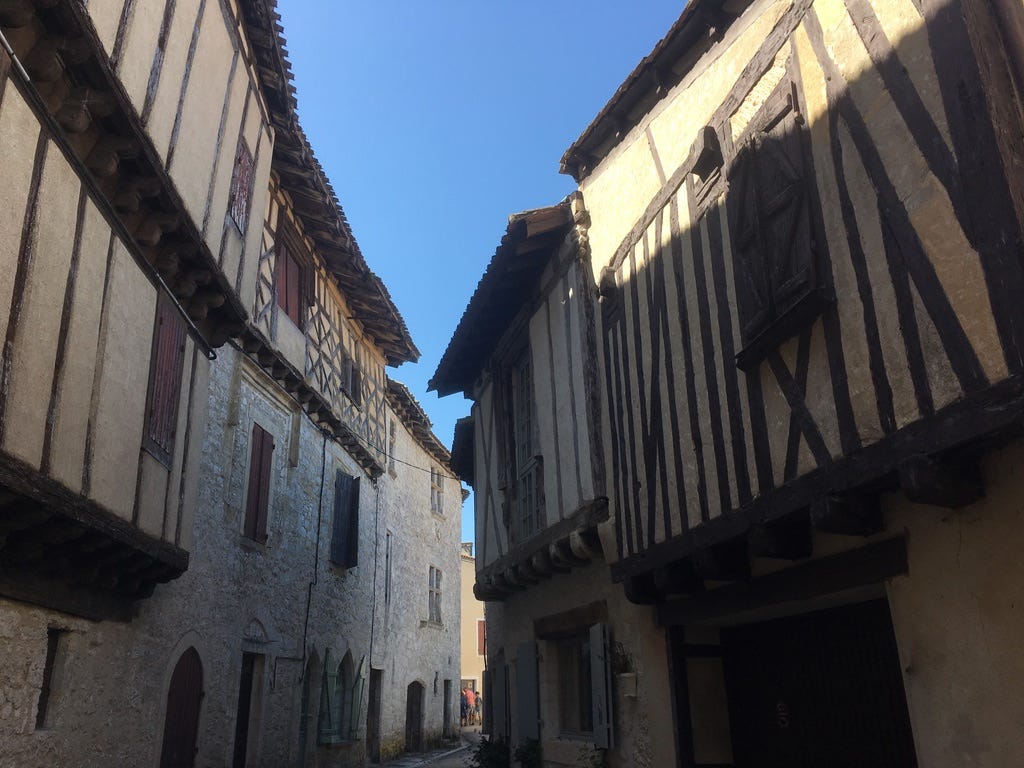This horse is decidedly, or rather has been in his youth, a buttercup …
Comte de Rochefort
There are people who laugh at the horse that would not dare to laugh at the master …
D’Artagnan
Dumas
Continuing to Search for Milady, way back in 2017, both through location and experience, my next subject was animals. People were dependent on creatures in the early seventeenth century: transport, food, clothing, warmth … I didn’t know anything about working with beasts, therefore I organised my next WorkAway at an animal sanctuary.
From Paris, I took a train to Bordeaux. The countryside flattened into large industrial-scale farming. Not many trees. Then landscape evolved into Berjerac, famous for wine.
My new Workaway was a dreamy seventeenth-century farmhouse surrounded by voluptuous lawns and distant forests. The work began at once, unloading the feed that had arrived in the same trip as me. I shouldered the first sack, delivered it to the potting shed used for storage, and checked out the verdant scene. A few horses were just in sight of the house, grazing contentedly. The dogs were friendly. A couple of cats lounged over the outside table. The black sun-worshipper panther was called Aramis (hey, Dumas!) All would be well.
Inside the house felt like a job-lot interior design show-home with luxurious curtains flouncing, antique books lining the shelves, and plump furniture. Bit alarmed the other WorkAwayer, Suzannah, a smart young photographer from Hungary, had been there for ten days with no time off. She was housed in a self-contained apartment. My room was near the boss, A., in the main area of the house, normally taken by one of A’s daughters. On my first night one of the cute cats crept into the shared bathroom with me, jumped onto the bench, turned its rear to a small painting of a yacht on blue sea, and sprayed it, copiously, firmly, and directly. No cat came into my room or bathroom again. The yacht disappeared.
The first week was constant mucking out, feeding hay - every two hours. We fed them so much hay! And then A. said perhaps we’ve been feeding them too much. It felt like we were on a roundabout.
We began at 08:00 and finished when we closed the stables at 21:00. First, opened the garage to let the naughty spraying/fighting cats out. The animals all had their little peccadilloes. Two senior cats normally slept in the garage, ones guilty of spraying, pissing, or fighting in the night. The cats and dogs were offered a buffet: pasta with veg and olive oil, sensitive, baby, and elderly kibble, canned salmon and chicken). Two old gingers were handed chicken pieces, and various ones drank bottled water from the dining table because they didn’t like tap water.
The designer curtains sparkled as they lay on the outdoor benches to dry in the sun. Cat spray tended to smell if not washed straight away.
After Fedj (bad-tempered stallion) and Victor (companion donkey) were fed in their field, the focus turned to the main stable and bulls, then the quails. These little beauties ate handfuls of scattered seeds and worms. Then we visited the goats. Sometimes escaped, they required a search through the forest before feeding.
After human breakfast we cleaned up, paying particular attention to indoor litter trays. By the time we got round to mucking out the stables, it was time to feed the horses again. If it was hot we had to hose the curtains of the stables. The bulls had their own shed but often chose the stables because of the cooling fans.
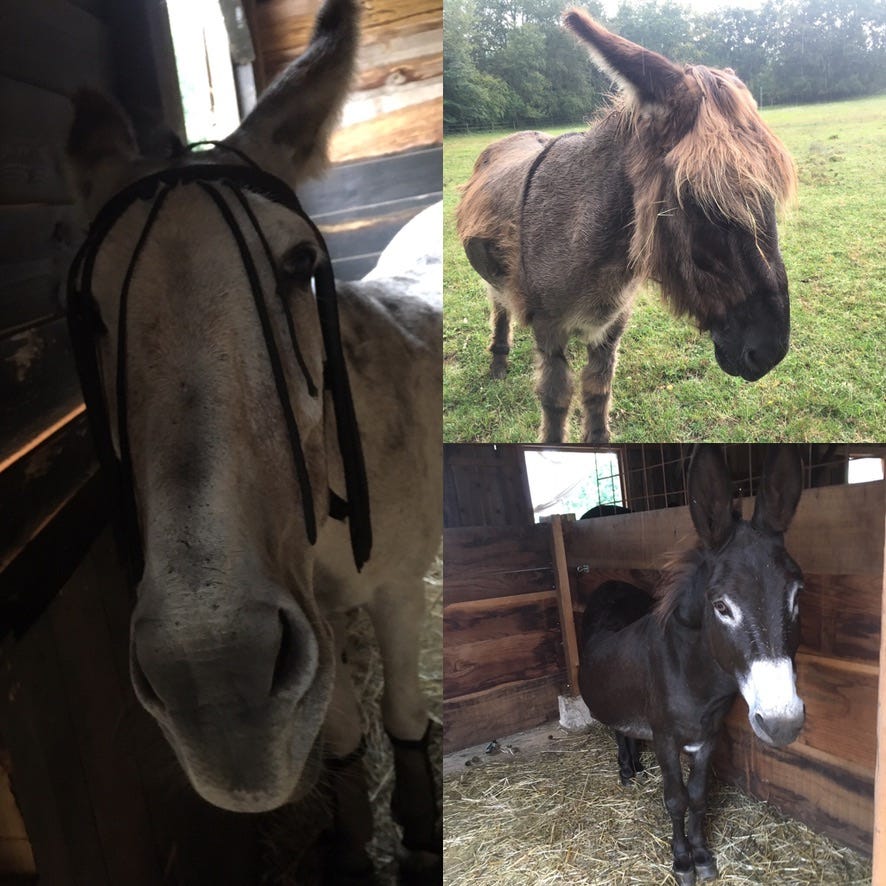
Victor was a lovely donkey with a dramatic stripe across his back and what could be the remains of wintery shaggy fur. Suzannah was particularly fond of this creature and would often go to visit him.
A. had difficulties. Her place was huge and required constant maintenance. She had fifty animals, two daughters, a mother next door, and twenty-one hectares to worry about. She was in some kind of financial bear-trap.
She was also in mourning for two of her favourite animals. A horse died as a result of leaving it in the care of some WorkAways. A cow died - her very best friend in the world - and mother of the bulls. A. worried: how to buy feed, how to pay taxes, and how to deal with her complicated family. My fellow WorkAwayer also had private concerns and both women confessed these anxieties to me. I found myself getting stressed trying to make peace between the two women where I should never have been. I came to learn about animals, not humans.
Tarabelle the grey mottled donkey, was the only one, anti-social though she was, who seemed to take an interest in me. She trotted up to have a chat and a pat and had to avoid everyone else. She also took a pat from Suzannah but she leaned on me like a big dog. It was daunting. Tarabella was my height. She had long and tough ears flexing up. Her hair was soft and rose up to a tufty mane. She wore a rather fetching Cher-like black fly curtain around her head to keep her eyes clear of bugs. It looked like a kind of sixties groovy fringe. Her huge black eyes were glassy. She had large jowls, grey but mottled, so some hair was white and some was black. She had the look of a rock, a flocked rock, so more carpet than stone. Her belly swung out wider than the rest of her. Not so funny when she kicked out, as she did when she was annoyed, perhaps by the bulls following her to get hay. One day, I thought we were having a nice chat, I was patting her face, when she pushed me, quite forcefully, with her nose, in my solar plexus region. As if to say, ‘For God’s sake, why do you not speak Donkey? You should do what I want!’
After we’d fed and sequestered the bulls, (because the horses were greedy and stole the poor bulls’ food) and the horses were delivered their assigned buckets of feed supplements and Bach Flower remedies, we had our breakfast. Later we came back to the stable to change Opaline’s bandage. She was wounded when a WorkAwayer did not open the stable door correctly and the latch gouged a great wound in her right side. It was a hole about the size of tennis ball. The WorkAwayer could not take the responsibility, and left as soon as A. could get him to the station.
Suzannah asked me, ‘Why do you not get any messages or phone calls from your family?’ Suddenly I was overwhelmed with grief.
While we worked with Opaline, there was a gathering of beasts; the two bulls and Yuki were outside, waiting. Hermes was a mainly white bull and Kronos was mainly black. They were brothers and docile. They were only two years old.
Yuki was mainly brown. He was solid with a dark mane and tail. The tail had a flash of glamorous blonde like the mum from The Addams Family. Yuki’s eyes were large limpid and brown. He had one melting snowflake on his forehead. His best friend was Tin Tin (in French, sounds like Tan Tan), an almost classic donkey. Tin Tin was dark brown with white around his eyes and a nose bag of white around the nostril black as if he’d dipped the tip of his nose into black mud.
There were three AirBnBs of various sizes on the property. Due to recent changes in tax laws, the properties could only be advertised by word of mouth. Never stated, there was a strong inference the area around the BnB and the pool was primarily for paying guests.
This reminded me of my second-ever job as gardener in an old people’s home in Dunedin, New Zealand. My excellent colleague, Alana, and I were both students at Otago University on our summer holiday break. One day, as we finished trimming the hedge along the main road, we were ordered to quickly tidy up and remove ourselves from the front of the building. Miss Otago, the recently titled beauty queen, was coming to visit.
Suddenly Alana and I were struck with inspiration and began work on a comedy skit entitled ‘Life with the Council Workers’. This entailed hilarious leaning on spades and rakes, slow motion shifting of hedge clippings into the wheelbarrow, and severe overacting, hiding behind things and peering around corners. I’m sure Miss Otago was having a very nice time meeting the senior citizens. Alana and I were supremely funny.
I did get messages every now and then that Suzannah did not know of! Once I received a delightful phone call from a friend, Doctor Vicki, in Wellington, NZ. She offered me a place to stay and a plan for the future in the kindest of ways. It was so lovely to hear from her and to know she was thinking of me.
While Suzannah and I contemplated how we could get some time off, I tried to concentrate on the animals and imagine an extended family sleeping in the same room for warmth in the winter. The smell? The women struggling with long skirts in the summer? There would have been beasts, feed, and birds all near the bread oven. The third (far more glamorous) AirBnB would have been a food store - preserved plums, plum wine, apple cider - perhaps a shop of sorts. They would have kept doves and pigeons for guano, meat and eggs in the pigeonnier. Next door, chickens, then the next room for pigs, and then cows. Over them all loomed the large hayloft, now bed/bath/kitchen, dining and sitting room of Suzannah’s apartment.
The stairs were more of a ladder and may even have been original from 1650 when the house was built. There was also a bread oven in the room under the pigeonaire. Would that have been the original kitchen? Wouldn’t that have been closer to their living quarters?
A. created a mudroom, where the cats were fed, as part of the kitchen/laundry, with a step up to the kitchen. The dining room had enormous grey flagstones and the sitting room featured an imported antique fireplace. Above both these rooms was A’s space, large and elegant with a similar imported lintel above the fireplace. This was not a mantlepiece, you could not put anything on shelf space, it was just a strong wooden beam across the mouth of the fire.
Finally, a break in the routine! The boss took us to visit a gorgeous medieval town, d’Issigeac, with a regular market, La Table des Producteurs. Many artists chose to live there - drawn to the vibe of tourist wallets, and historic charm. A. let us wander for an hour - the first thing I found was an organic pear, and a vegan raisin roll. Scrumptious! There were even vegan cheesemakers fooling their French customers with delicious artisan products.
Back to work. Each day we fed dogs and cats, then Victor the shaggy donkey and Fedj the Arab stallion, poor thing, his face so covered with flies he looked like a spotty adolescent from a distance, then back to the stables with two buckets for the bulls. These we hid behind the hedge in case the horses saw them, for they were greedy. One day none of the horses were there so A. took a risk and fed the ponies first. Didn’t pay off. Got Opaline in quietly but then Yuki came at a run to grab the buckets which I threw out of reach over the fence. Then there were three special containers, one for Buki (pronounced Bookie) a very big brown horse with a white flare down his nose, Opaline and Giddy.
A. discovered Giddy was depressed. She’d had two animal whisperers, or folk who say they could communicate with him, tell A. he felt unimportant, unused and invisible. A. said that’s how she felt.
Giddy might have been a contender, perhaps in trotting or something grander. Maybe he had a taste of glory but he was destined for the knackers when the boss saved him. A. was going to have a talk with him about self-worth and the fact she saw his life as valuable. So much so she brought him for his beauty alone. He was very beautiful.
I gratefully accepted an offer to tag along when A. needed to do some chores in Perigeux. Suzannah, preferring time alone, remained with the animals. Through the centuries Perigeux suffered invasions, bombing, and flooding. With only the briefest visit, I didn’t find the medieval with the dramatic exception of the jetted Eschif, built in the fourteenth century. Taxes.
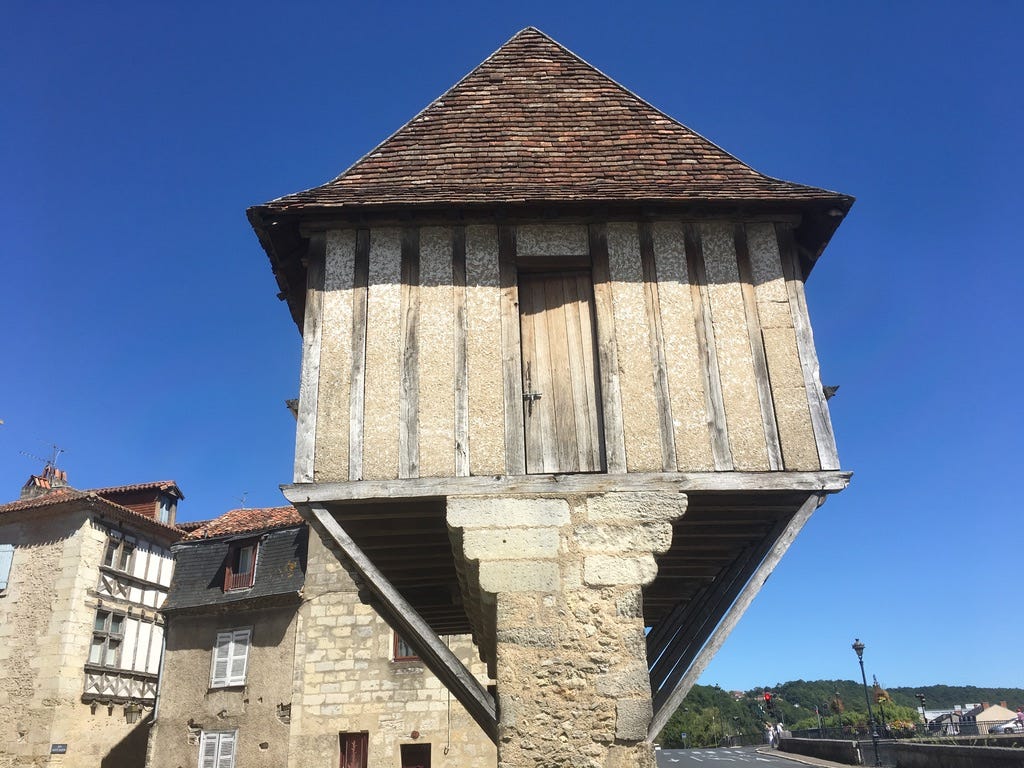
Realising not all WorkAways were gregarious, friendly experiences, I departed before the allotted time. On my last day A’s neighbour delivered a truckload of poor quality hay. He’d mistakenly purchased it, too many thistles for his cows, so he donated it to A’s sanctuary. We heaved bales of hay into the donkey shed and even stacked the horse float to the ceiling. The farmer’s name was Ghee (Guy?) and he was the picture of a French farmer from a children’s book. He was rotund, one arm out of his overalls, dusty with hay, cheery jovial face, beret on top. Very calm, although I did see him regard the two bulls with some interest. The fence between his cows and A’s bulls was mere decoration.
Although we were all rescues, the four-legged animals did not work at this WorkAway. Only the humans. When I thought about it, in the early seventeenth century, every day would have been a working day. But not merely for the animals. The animals would have worked for the humans.
The ride-on mower was A’s happy place. She would swing around the lawns, her blonde hair blowing back from her face, denim mini skirt riding up her elegant brown legs, her face peaceful, smooth and calm. There were no lawns in the early seventeenth century. However, they soon became a symbol of indolent wealth as landowner could afford to have gardeners scythe the potential feed low to the ground for the smooth look and level play areas.
Suzannah said she learned two important lessons from me. Yes? I said, fascinated, do tell!
‘It’s not my problem,’ and, ‘We can only do our best.’
Four legs good, two legs better! All Animals Are Equal. But Some Animals Are More Equal Than Others.
George Orwell, Animal Farm

